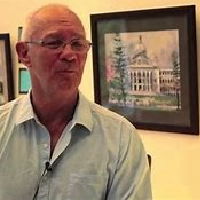Professor Allan Lavell

Speech Summary
Structural and residual disaster risk reduction are key priorities of the intergovernmental Sendai agreement as they were for Hyogo and are key in achieving the UN Sustainable Development Goals. Structural DRR comprises two differentiated practices, firstly corrective, mitigatory reduction of existing risk and secondly, preventative, prospective, avoidance or control of potential future risk. Residual risk reduction can be achieved through compensatory, pre and post hazard event impact actions, whether through early warning and anticipatory action, response, recovery and reconstruction or resilience building in general.
Despite the priority nature of these practices, a very large gap exists between policy and concept and on the ground practice, with the result that disaster risk has and grows rapidly in many parts of the world today, severely challenging the achievement of the SDGs. As disaster risk is predominantly a social construction, a result of failed or skewed development practice, DRR, particularly its prospective mode, can only be satisfactorily achieved through the use and risk dimensioning of existing development instruments and strategies, including those of a spatial, sectoral (social and economic), and environmental nature. The conference will examine disaster risk construction processes and the corresponding necessary development based DRR mechanisms at different scales and locations in more developed countries and the global south.
Brief CV
Allan Lavell was born in England and has lived continuously in Latin America for 50 years. He has a PhD and M.Sc. in Economic Geography from the London School of Economics and Political Science-LSE. Specialist in urban and regional development, since 1989 he has been dedicated to the study of disaster risk and climate change and its management. Currently an associate researcher at the Latin American Faculty of Social Sciences, Costa Rica, he has been a professor and researcher at the University of London, Middlesex University, the Metropolitan Autonomous University of Mexico and UNAM, the Central American Higher University Council and the University of Costa Rica. He has written more than 150 chapters, articles, documents and scientific books on the topics of risk and disasters and urban development, has given more than 150 international conferences in 42 countries around the world and has carried out nearly 90 consultancies in 32 countries on five continents. He has been a member of numerous global and regional scientific committees and editorial boards of journals and books and was a co-founder of the Network for Social Studies in Disaster Prevention in 1992. He has been a recipient of the UN Sasakawa Prize. in 2015 from 88 applicants, in recognition of his contributions to the development of risk management worldwide.
